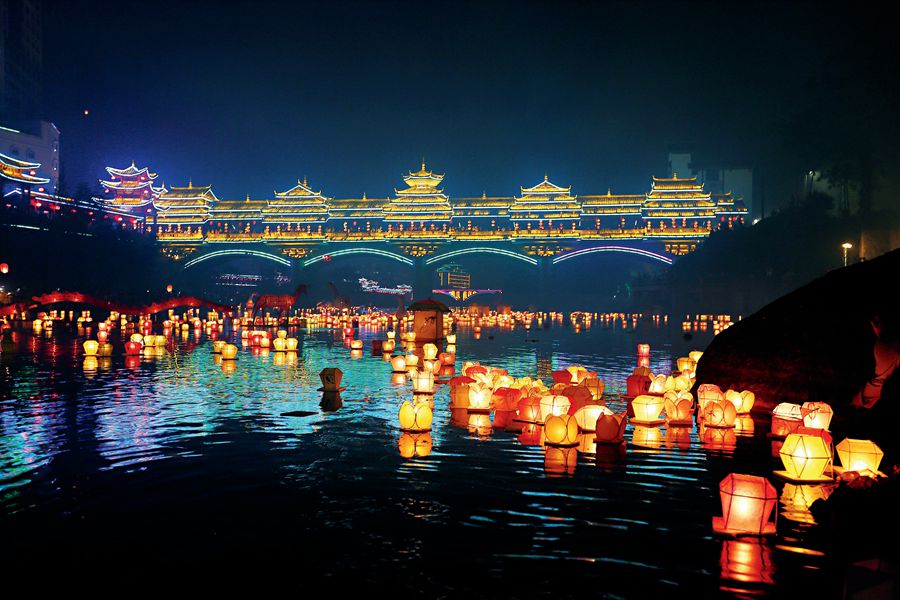THE fifteenth day of the seventh month of the lunar calendar (August 15 this year) is the Hungry Ghost Festival or Zhong Yuan Festival. It has been a day for ancestor worship, mourning for the dead, and burning paper money to honor the deceased. The Hungry Ghost Festival and New Year’s Eve, Qingming Festival, and Chongyang Festival (which will be introduced in detail later in this magazine) are the traditional festivals in which Chinese people pay tribute to their ancestors, each having their own characteristics. As an ancient Chinese traditional festival, it has a history of thousands of years.
Origins
The Hungry Ghost Festival is an ancestor worship day, originating from the ancient practice in China of offering sacrifices to ancestors during harvest time. In autumn, ancient Chinese also offered seasonal delicacies to appease their gods. Then they tasted the fruits of their labor and prayed to gods and their ancestors for a good harvest in the coming year.

On the evening of August 16, 2016, tens of thousands of people in Ziyuan County, Guilin, Guangxi Zhuang Autonomous Region participate in river lantern drifting activities along the Zijiang River, praying for good weather and peace.
According to historical records, the activities of ancestor worship in autumn first began in the pre-Qin period (2100-221 BC). At first, the activities were only meant for the emperor and princes, but later the practice spread to the general public. The date of ancestor worship was uncertain in the beginning, then gradually it was fixed on the fifteenth day of the seventh month of the lunar calendar every year, which usually falls on the first full moon day in autumn.
The transition of the Hungry Ghost Festival into the “ghost festival” originated from Taoist practices dating back to days after the Eastern Han Dynasty (25-220). Legend has it that on the day of the Hungry Ghost Festival, the gates of hell were opened, and all the ghosts were released for a short period of freedom. Ghosts who had relatives would return home, and those without relatives would wander around the mortal world. Consequently, festivals were held at this time to offer sacrifices to ghosts, and people lit lotus lamps to illuminate the way home for the wandering souls. Daoist temples held grand religious assemblies to release souls from purgatory.
Later, the Hungry Ghost Festival also bore the influence of Buddhist culture. Buddhism named the day of Hungry Ghost Festival “Ullambana Festival” in which ceremonies were given to free the lonely souls in the underworld. The two customs gradually merged with the passing of time. During the Tang Dynasty (618-907), when the rulers advocated Taoism, the Hungry Ghost Festival began to flourish, and “Hungry Ghost Festival” gradually became the fixed name of the festival.
At present, the Hungry Ghost Festival has become a traditional cultural festival in Chinese-culture-influenced countries and regions and among overseas Chinese.
Legends
It is said that Cai Lun invented paper making during the Eastern Han Dynasty, and the shop he ran prospered so much that it brought him great fortune. His brother Cai Mo and his sister-in-law Huiniang greatly admired him, and Huiniang urged Cai Mo to learn paper making from Cai Lun. But Cai Mo lacked the spirit of perseverance and was anxious to open a paper shop before he had even acquired proficiency in the skill of the trade. Subsequently, the paper he made was of such poor quality that nobody showed interest in buying it.

On August 10, 2014 a man of the Zhuang ethnic minority happily lifts out of the water a duck he has just grabbed in Liaohe Village, Wangtong County, Liuzhou City, Guangxi Zhuang Autonomous Region.
Sometime later, Huiniang came up with a brilliant promotional plan and told Cai Mo to cooperate with her in carrying it out.
One night, the neighbors suddenly heard Cai Mo broke into violent mourning in his house. Everyone rushed over to inquire about what had happened, only to hear that Huiniang had died. The next morning, in the presence of the neighbors, Cai Mo cried in front of her coffin. As he cried, he began to burn paper. Then suddenly they heard the voice of Huiniang from inside the coffin, “Open the cover, open the cover quickly, I’ve returned.” As the people mustered up their courage and opened up the coffin, Huiniang jumped out. After coming out, she told the neighbors that she had decended into the underworld after her death, and the King of Hell tortured her by having her turn a millstone. Because Cai Mo burned a lot of paper money, the ghosts all scrambled to turn the millstone for her. She then gave the paper money to the King of Hell, who let her return to the world of the living.
Cai Mo deliberately said in an astonished tone of voice, “But I didn’t give you any money.” Huiniang pointed to the burning fire and said, “That’s money! The underworld regards paper as money.” When Cai Mo heard this, he immediately brought out two large bundles of paper to burn, saying that he wanted to reduce the suffering of his parents. As the neighbors learned that paper money was so useful, they all decided to buy Cai Mo’s paper. Soon the news spread, and all the paper Cai Mo had made sold out within a few days.
Because the day that Huiniang came back to life fell on the fifteenth day of the seventh month of the lunar calendar, this custom of burning incense and paper for their ancestors on this day started.

